US Sanctions Three Influential Lebanese For Corruption
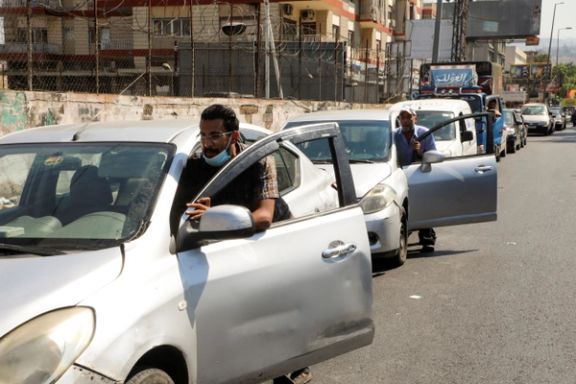
The US Treasury on Thursday imposed sanctions on two top Lebanese contractors and a lawmaker close to the Hezbollah movement over large-scale corruption.

The US Treasury on Thursday imposed sanctions on two top Lebanese contractors and a lawmaker close to the Hezbollah movement over large-scale corruption.
Businessmen Jihad al-Arab and Dany Khoury, close to former Lebanese Prime Minister Saad al-Hariri and Christian politician Gebran Bassil respectively, were sanctioned for alleged corruption related to state contracts.
Lawmaker Jamil Sayyed was sanctioned for allegedly seeking to "skirt domestic banking policies and regulations" and transfer $120 million abroad, "presumably to enrich himself and his associates," a Treasury statement said. This will have an impact on Hezbollah’s reputation.
The Treasury alleged that Khoury and Arab both received state contracts worth hundreds of millions of dollars, thanks to political connections.
The allegations come amid an unprecedented economic crisis in Lebanon blamed on years of bad policies and corruption by the ruling elite.
Thursday's sanctions mark the first time a close associate of Hariri, a pro-western figure, is sanctioned by the US, which previously focused on Iran-backed Hezbollah and its allies.
"The Americans are sending a message to the entire political class, not just those backed by Iran," Maha Yahya, director of the Carnegie Middle East Center in Beirut, told Reuters.
US Secretary of State Anthony Blinken characterized the new sanctions on Twitter as "an important step in promoting accountability in Lebanon."
"Lebanese officials must end corruption and take urgent action to address the crises the Lebanese people face," he said.
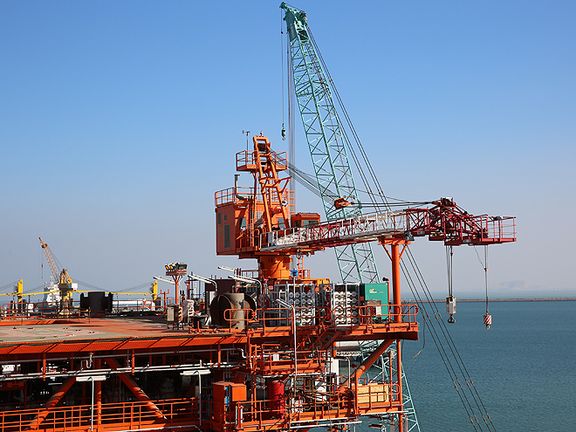
A top oil official in Iran has said that if new investments are not made in natural gas industry, the country will become a net importer in the next few years.
Iran has the second largest natural gas reserves in the world, holding more than 17 percent of global discovered gas fields, but the government has warned people of power cuts this winter, as it cannot supply enough gas to power plants that have to switch to dirty liquid fuels.
Mohsen Khojastepur, general director of the Iranian national oil company said this week that if investments in the gas industry are not secured Iran will become a net importer in the coming years.
Fararu news website in Tehran has confirmed that the natural gas crisis is solely the result of insufficient investments and lack of technology that only a handful of Western energy giants can provide. Just to maintain current production, Iran needs to invest up to $50 billion in its gas fields, especially in the Persian Gulf offshore South Pars reserves shared with Qatar.
Without this urgent infusion of cash and know-how, Iran will become a natural gas importer. But the Islamic Republic does not have the cash and US sanctions currently in place would not allow Western companies to have any business dealings with Iran.
The last chance Iran had of collaboration with a Western energy giant was a $5 billion deal it had struck with Total in 2016 to develop the South Pars gas fields, which fell apart in 2018 when former US president Donald Trump withdrew from the Iran nuclear deal and began imposing sanctions.
Iran’s gas fields, like any other in the world and similar to Qatar’s, have a natural production curve and underground pressure that pushes the gas out declines over time, needing modern technology to maintain production level. Qatar has invested in 20,000-ton production platforms, not only maintaining output but even increasing production.
Fararu also pointed out that not only in gas sector but also in oil production Iran has seriously fallen behind. On top of investment for gas fields, $150 billion is needed to modernize and increase oil production.
These facts have been known all along, but some local media in Iran are more openly and persistently discussing the huge economic challenges facing the country, which to an extent are linked with the resolution of Iran’s disputes with the United States.
The issue that some writers cautiously mention in Iran is whether the lifting of US sanctions can solve the huge economic challenges. If Iran did little to upgrade its energy industry a decade ago when its annual oil export revenue reached $100 billion, what it can do now with exporting $60 or $70 billion if the sanctions are lifted. They say the country has so many serious financial issues that it would hardly be able to make investments that for example Saudi Arabia has been making.
The other issue being discussed in Iran, both by critics and indirectly by the government, is the high level of energy consumption. Even with lack of investments Iran is the third largest producer of natural gas but most of it is used domestically without the corresponding level of industrial production. The reason is extremely cheap prices for both gas and electricity, which leads to waste.
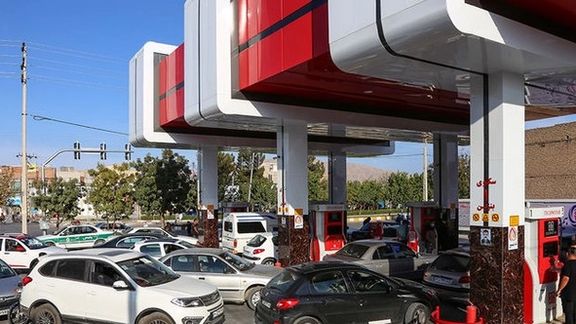
Kayhan Daily, a flagship hardline newspaper in Tehran, has accused Israel and the United States of launching an apparent cyberattack on Iran’s gas stations.
The newspaper, controlled by Supreme Leader Ali Khamenei’s office, in an editorial called Israel and the US the leading suspects in what Iran has said was a cyberattack that for two days has paralyzed gas stations nationwide. The paper also said that creating a national intranet and cutting the country off from the Internet should be a top priority, similar to producing accurate missiles and military drones.
President Ebrahim Raisi had insisted on Wednesday that the cyberattack was meant to anger the people to create unrest in the country.
Iran’s interior minister Ahmad Vahidi said the incident was plot by “the enemy” before the anniversary of the 2019 November unrest, that has become a symbol of the regime’s brutality for opponents and critics. During a few days of nationwide protests in mid-November 2019, government security forces killed hundreds of protesters using military ammunition.
Vahidi said the enemy has plans for the anniversary and the disruption of the fuel system was the first act. However, he said that the public was calm and showed no reaction, which he said proved that people believe in the sincerity of the authorities.
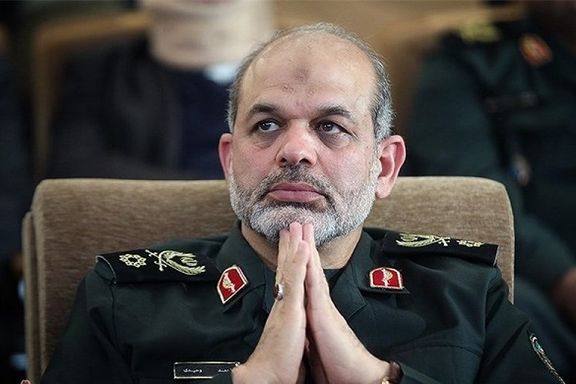
Iran has not officially confirmed the source of the apparent cyberattack. The head of civil defense agency has said that authorities have not confirmed foreign involvement in the attack.
So far, only 700 gas stations out of around 4,000 have returned to normal operations. The incident affected smart cards that people use to buy rationed gasoline at half price. Pumps were not affected that gasoline was sold at higher prices.
Immediately as the disruption began, speculation started on Iranian social media that the incident was not a cyberattack and it was orchestrated by the government to raise gasoline prices, which are heavily subsidized in Iran. However, unlike November 2019 when a sudden hike in fuel prices led to unrest, this time the situation was calm.
President Raisi has taken credit for the peaceful handling of the situation and hardliners have compared it with 2019 when the fuel price hike was said to have been so sudden that it triggered immediate protests.
Fereydun Abbasi, a member of parliament’s energy committee and a former head of Iran’s nuclear energy agency said the cyberattack by “the enemy” was meant “to anger the people” to create unrest. He urged that major vulnerable points in the country should be defended. He added that the enemy uses its best scientists to disrupt people’s lives and will launch new attacks with novel plans.
Iran has experienced several major cyberattacks and sabotage attacks since July 2020. Its uranium enrichment facility in Natanz was targeted twice with devastating effect and a few months ago its railroad system was crippled by a cyberattack. Both Iran as well as foreign experts and media have said Israel was behind the attacks, but no one has claimed responsibility. But Israel has repeatedly said it will not allow Iran to produce nuclear weapons and is ready to use even military force.
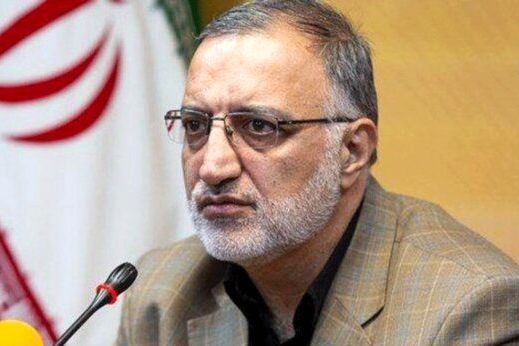
Nepotism was a top issue for Iran's official media that unexpectedly did not censor the news about Tehran's mayor appointing his son-in-law as his adviser.
When protest escalated in the press and on the state television and attracted everyone's attention with a mixture of jokes and sarcasm, mayor Alireza Zakani said that his son-in-law, Hossein Haydari is supposed to work for free.
Zakani was a hardline member of parliament before becoming a candidate in the June presidential election and lost. The newly elected city council, also with a majority of hardliners reluctantly appointed him mayor in August.
In a surprising development, the state television aired footage dating back to the June presidential election which showed Zakani promising as that he will not employ his relatives if he is elected President. The video went viral on social media in a matter of minutes.
He was not elected president, but he gave jobs to his relatives and his friends' relatives and even the daughter-in-law of an influential cleric in Shiraz, possibly hoping to use the cleric's influence in case political waters got rough, the media reminded.
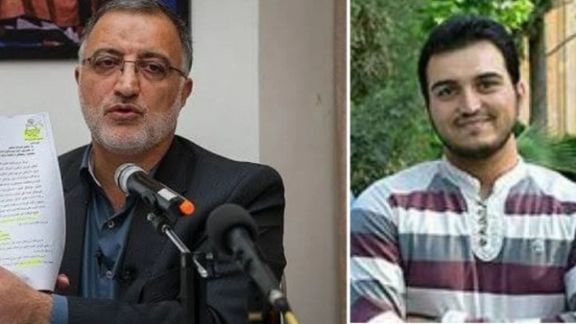
Many unemployed social media users as well as those not happy with their jobs regretted that they should have more carefully chosen their fathers-in-law rather than being picky about choosing their wives.
It appears that following recent changes in the management of state television, transparency and exposing nepotism and corruption is on its agenda, at least depending on who the target of criticism might be.
The new approach of reporting on such cases might be an attempt to restore credibility after years of sweeping scandals under the rug.
The public knows that appointing relatives to senior government posts is not just securing a job for them, but the influence and opportunity of networking and illicit incomes that come with the position.
The founder of the Islamic Republic Ayatollah Ruhollah Khomeini gave top jobs at the government and the Judiciary to his sons-in-law. In Iran under Ali Khamenei as Supreme Leader, his relatives including current Majles Speaker Mohammad Bagher Ghalibaf and former Majles Speaker Gholamali Haddad Adel have always had top positions in the government.

Reformist daily Sharq on Wednesday, October 27 listed some of the sons-in-law in top positions. One who has been appointed most recently is Mehdi Ahmadi, a son-in-law of Mohsen Rezaei, Vice President for economic affairs. Ahmadi was appointed as the CEO of Bank Saderat Iran, one of the most prominent financial institutions in the country. However, he told Sharq that he has quit his new job “after he consulted the Koran.” Ahmadi, who is also a relative of Ghalibaf, is still a board member and acting CEO of Bank Shahr.
Another top son-in-law was Ali Ashraf Riahi the husband of a former industry minister's daughter. He fled the country after being convicted in a major financial corruption case, Sharq wrote.
Former President Hassan Rouhani's son-in-law Kambiz Mehdizadeh Farsad had to quit his job as deputy industry minister after critics charged that his appointment to the post was illegitimate. In his resignation letter, Farsad said he would return to his former "trench" as a research scientist.
Another controversial son-in-law was Mohammad Hadi Razavi, who is married to one of the daughters of Rouhani's former labor minister Mohammad Shariatmadari. When the son-in-law was being tried in a major financial corruption case, Shariatmadari said, "No one can blackmail me even if they slaughter my child." Razavi was eventually sentenced to 20 years in jail for disrupting the country's economic order.
Haddad Adel's son-in-law Ruhollah Rahmani had to resign his top position at the ministry of communication for quietly holding US citizenship. Haddad had said on state TV: "My son-in-law is a citizen of America and comes from a family that nurtures martyrs." Haddad's other son-in-law is Khamenei's son Mojtaba.
Former President Mahmoud Ahmadinejad's brother-in-law Mehdi Khorshidi was first appointed as the head of Iran's Standardization Organization. His appointment was cancelled after the Majles protested, but one of Ahmadinejad's vice presidents appointed him as an adviser.
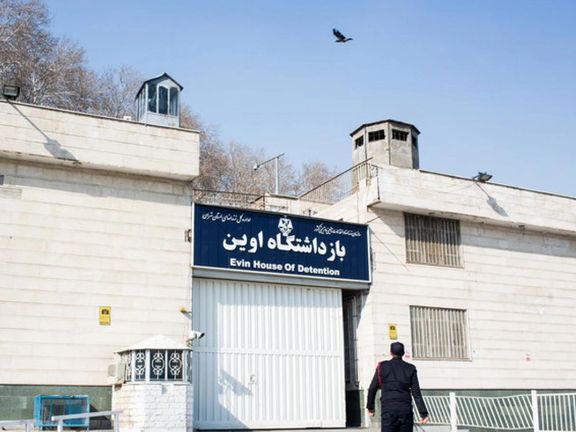
A political prisoner in Tehran’s Evin prison has reportedly tried to commit suicide by self-immolation after his please for conditional release were ignored.
Mehdi Darini, a 35-year-old independent activist was arrested in 2019 and sentenced to10 years for "unlawful assembly to disrupt national security” and “propaganda against the regime”, vague political charges commonly used to convict activists and protesters.
Kayvan Samimi, another political prisoner, reported about the suicide attempt on his social media account. He said that Darini set himself on fire and was rescued by other detainees and guards who took him to the prison infirmary. He said his condition is satisfactory.
Darini is a production engineer and his family owns a company that produces kitchen appliances.
According to Samimi, he repeatedly asked for conditional release, but his interrogator and judicial authorities ignored him.
At least more than a dozen political prisoners have died under suspicious circumstances in Iranian jails in the past 12 years. Some had obvious signs of torture, while in many cases it was not independently possible to determine the exact cause of death.
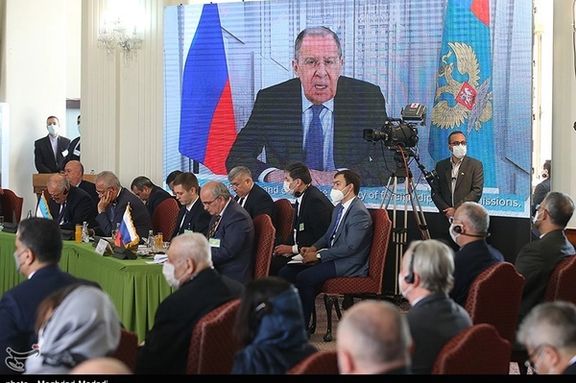
A meeting of Afghanistan’s neighboring states in Tehran condemned violent attacks "in all shapes and forms including those against ethnic and religious groups."
The foreign ministers of Iran, Pakistan, Turkmenistan, Uzbekistan, Tajikistan, China, and Russia called Wednesday for an "inclusive and broad-based political structure with the participation of all ethno-political groups," and urged the world, including the United Nations, to provide urgent economic and humanitarian assistance.
The message of the conference in Tehran was clear, Iranian foreign minister Hossein Amir-Abdollahian tweeted Wednesday afternoon: "Peace will only stem from [an] inclusive government [and] respect for [the] will of Afghan people."
In a press conference after the meeting, Amir-Abdollahian said the Taliban were in charge of a caretaker government. Amir-Abdollahian said Afghan assets held by foreign banks should be released before winter sets in, and that humanitarian and economic support should be provided to prevent insurgents exploiting hardships.
Iran’s neighbors have delayed formal recognition of the new authorities but there is growing acceptance internationally of the new reality in Kabul. The European Union is soon to reopen its diplomatic mission, withdrawn to Qatar in August.
Iran has said that one aim of holding the Tehran meeting was to convey the message of "opposition to foreign interference," a sideswipe at the United States, which ended in August its 20-year military presence. The Russian and Chinese foreign ministers participated via video-link, while United Nations Secretary General Antonio Guterres sent a message.
The Taliban were apparently not invited but welcomed the initiative. Opinions in Iran over how to deal with the situation in Afghanistan are mixed, with reformist and some conservative voices opposing recognizing the Taliban without offering a clear alternative.
Russia has suggested it would recognize the Taliban if it met several conditions. Amir- Abdollahian said participants had reached basic agreement on the Taliban joining the next neighbors’ gathering provided representatives of all major Afghan ethnic groups were present.
The meeting came a week after the meeting in the Russian capital of ‘Moscow Format Consultations on Afghanistan,’ which brought together Russia, China, Iran, India, Pakistan, and four central Asia republics. A closing statement – from which Tehran dissented for reasons that remain unclear – assessed the Taliban as de facto rulers of Afghanistan irrespective of formal recognition internationally.